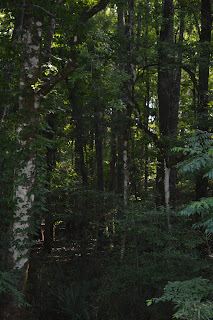 |
| The Old U.S. Road where it passes over Jericho Pond north of Marianna in Jackson County, Florida. |
It is also the center of a bizarre ghost story that has its roots in the turbulent days of the Reconstruction era.
I was reminded of the story a few years ago by a retired Jackson County resident who said that it was one of three ghost tales that he vividly remembered from his childhood. The other two were the Ghost of Bellamy Bridge and the haunting of Holyneck Road.
The legend holds that Jericho Pond is haunted by the ghost of a freedman (i.e. freed slave) who was murdered there during the years following the War Between the States (or Civil War).
 |
| Jericho Pond |
Travelers would avoid following that section of the road at night, especially in the days before automobiles, because of the ghost. Residents of the area claimed that the spirit would waylay wagons or buggies at Jericho Pond, unhitch the horses or mules pulling them and then try to make its escape by riding them away. Drivers would be left stuck in the swamp with their vehicles.
The road passed by an old church not far away, however, and the ghost could not set foot on holy ground. People who walked out of the swamp after having their horses or mules taken would find them grazing peacefully in the moonlight of the churchyard, left there by the ghost as it returned to pond.
Each escape attempt ended in the same way with the ghost left trapped in its perpetual haunt.
The tale of the Ghost of Jericho Pond began to fade with the arrival of automobiles and the eventual widening and paving of the road. I remember from my own childhood, however, stories of a ghost that would try to stop cars on Old U.S. Road.
 |
| The dark swamp of Jericho Pond. |
The new reality did not extend the right to vote to women and Native Americans and more decades would need to pass before they too gained suffrage.
Florida in 1867 was a place of simmering emotions. Rumblings in the U.S. Congress made it clear that Abraham Lincoln's dream of a peace "with malice toward none, with charity for all" was not the goal of many political leaders. Calls for the punishment of the South were rising in Washington, D.C., as politicians - many of whom had stayed as far away from battle as possible - demanded that Constitutional protections be suspended in the former Confederate states.
 |
| Another view of Jericho Pond, where Gilbert Walker was killed by Hugh Parker in 1867. Walker's ghost supposedly haunts the swampy pond. |
In this time of growing tension, an incident took place at Jericho Pond that characterized life in 1867.
Two wagons approached the pond from opposite directions on the Old U.S. Road. One was driven by Gilbert Walker, a freedman, and the other by a white farmer named Bell. The passage of the road through the swamp was narrow and it was impossible for two wagons to pass by each other.
Each man pulled his wagon as far to the side as possible but there was still not enough room for them to pass. Seeing this, Walker got down from his wagon and pulled back the limbs that extended from roadside bushes to help Bell get past. It was at this point that a third man, named Hugh Parker, arrived on the scene.
Parker lived in Texas and was making his way home through the Deep South. He ran up to Walker and demanded to know why he had not gotten his wagon out of the road so the other man could pass. The freedman explained hat he had done so as well as he could and was holding back the brush so that Bell could get by.
This did not placate Parker, who warned that he would kill Walker if he ever again failed to give way for a white man to pass. Before either Walker or Bell could attempt to explain further, Parker suddenly pulled a pistol and said, "I might as well do it now."
 |
| T. Thomas Fortune, who recalled the search for Walker's killer, was born into slavery in Jackson County but later became a prominent writer and newspaper publisher. |
The murder shocked Jackson County and alarmed black and white residents alike. T. Thomas Fortune, a prominent African-American newspaper publisher of the late 19th and early 20th centuries, in 1867 was the young son of Jackson County freedman Emanuel Fortune. He published his memories of the search for Parker more than 60 years later:
...The news of the tragedy swept through the county like a prairie fire. Negro men and women from every direction swarmed into the village [i.e. Marianna], fighting mad and determined to be avenged. The village and nearby swamps and forest were thorough searched for the bloody miscreant, all of the afternoon and night, but he eluded capture. It was good for him that he did, as the Negroes were outraged and thoroughly aroused and would have torn him limb from limb if they captured him. - (Philadelphia Tribune, July 28, 1927).
The passage of so much time caused Fortune to mistake the murderer, Hugh Parker, for Sgt. Thomas Barnes, but the alarm caused by the killing was every bit as vivid as he described.
Parker was never apprehended for his role in the crime, which may be why Walker's ghost became associated with Jericho Pond. Perhaps he continues each night an attempt to escape the injustice that befell him there 150 years ago.
Dale Cox
May 12, 2017
No comments:
Post a Comment